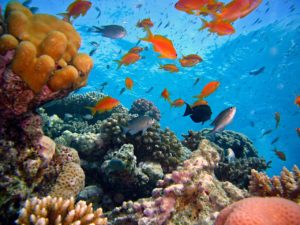Spirited Reflection: Beholding a turtle

Sunning itself on a log near the shore of Six Mile Lake in Muskoka was a small turtle with its eyes closed. I crept up closely and gently picked up the turtle in my hand. Immediately, its little legs danced in the air. When I looked at the bottom of its shell, I saw an amazingly complex work of art in colour and design.
As I reflected on that turtle shell, it occurred to me that every single one of the thousands of turtles living in that and other ponds bear a natural work of exquisite art that many of us will never see. As a veteran scuba-diver, I’ve seen God’s unseen treasures of incredible beauty over many years hidden underwater.
I recall my first dive in the Caribbean waters off the coast of Grand Bahamas. I was gliding over the sandy bottom of the ocean at a depth of thirty feet when I sailed out over an underwater cliff plunging five thousand feet into darkness. Over the edge of that cliff I saw a dark shadow moving out of the depths toward me. Wide eyed, I followed that shadow as a fifteen foot wide Manta Ray emerged from the darkness. As it came close, it lazily flapped its wings to fly by me. In addition to such thrilling encounters with large forms of undersea life, there are sponges, coral, green eels, groupers, sea turtles, and the reclusive puffer fish whose design defies all rules of survival.
One cannot help but wonder who looked upon this spectacular scenery for the millions of years of its existence. Perhaps only God who created underwater landscapes too stunningly breath-taking for words.
‘Spending’ nature
In a poem by Gerald Manley Hopkins called, God’s Grandeur, he writes this: “The world is charged with the grandeur of God. And for all this, nature is never spent because the Holy Ghost over the bent world broods with warm breast and with ah! bright wings.” When Hopkins penned these words in the mid-19th century, it was possible to believe that nature was so overwhelmingly powerful and grand, that the hand of humanity could do it no harm so that “nature is never spent.” However, the influence and magnitude of our human impact has grown exponentially since Hopkins wrote this poem.
In the spring of 2010, the Deepwater Horizon, situated in the pristine waters of the Gulf of Mexico, was at the centre of the largest oil spill in human history. Over the course of eighty-seven days, one could view a close-up video feed of ten million litres of toxic sludge pumped into the Creator’s life-giving and life-bearing oceans every day, totalling close to one billion litres by the time the well was capped.
We now understand that global warming is responsible for the bleaching of coral reefs, the cradle of ocean life around the world. Unlike periods of global warming in the past that occurred over tens of thousands of years, human contribution to greenhouse gases in the atmosphere is heating up the world’s oceans at a pace so rapid that coral cannot adapt to the temperature change. Hence, from Australia to the Caribbean and from Japan to Hawaii, coral reefs are dying.
On the cover of the June 2018 issue of the National Geographic magazine, is a plastic bag floating in the ocean like an iceberg. This issue highlights the dangers of plastic pollutants in the ocean from a sea turtle with a straw wedged up its nostril to the Great Pacific garbage patch, 1.6 million square kilometres in size containing an estimated 80,000 metric tonnes comprised of 1.8 trillion plastic pieces. The magnitude and consequences are truly staggering. Human liability is perhaps even more unspeakable.
In the Book of Genesis, we read that God has given to humanity the opportunity to have dominion over all living things. This does not give humanity the right to exploit the earth, rather it imposes the responsibility to be good and faithful stewards of God’s creation with a respect for and protection of the diversity of life and beauty with which God has blessed the planet today and for generations to come.
Secretary-General of the United Nations from 1997-2006, Koffi Annan said: “All of us need to care for the earth’s fragile ecosystems and precious resources. Each of us has a role in preserving them. If we are to live together on this earth, we must be responsible for it.”
The Reverend Wes Denyer has been minister of Rosedale Presbyterian Church in Toronto since 2011. He is an avid hiker and scuba diver with a lifelong love of nature and an advocate for marine ecology. For the last 25 years he has been active in the movement for full inclusion of LGBTQ+ persons within the Presbyterian Church in Canada.
Published in recognition of World Environment Day on June 5.







